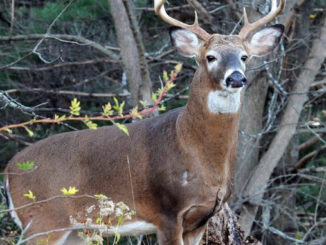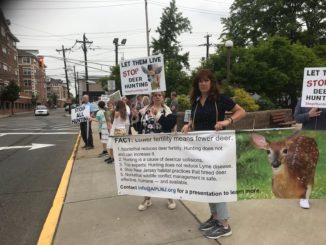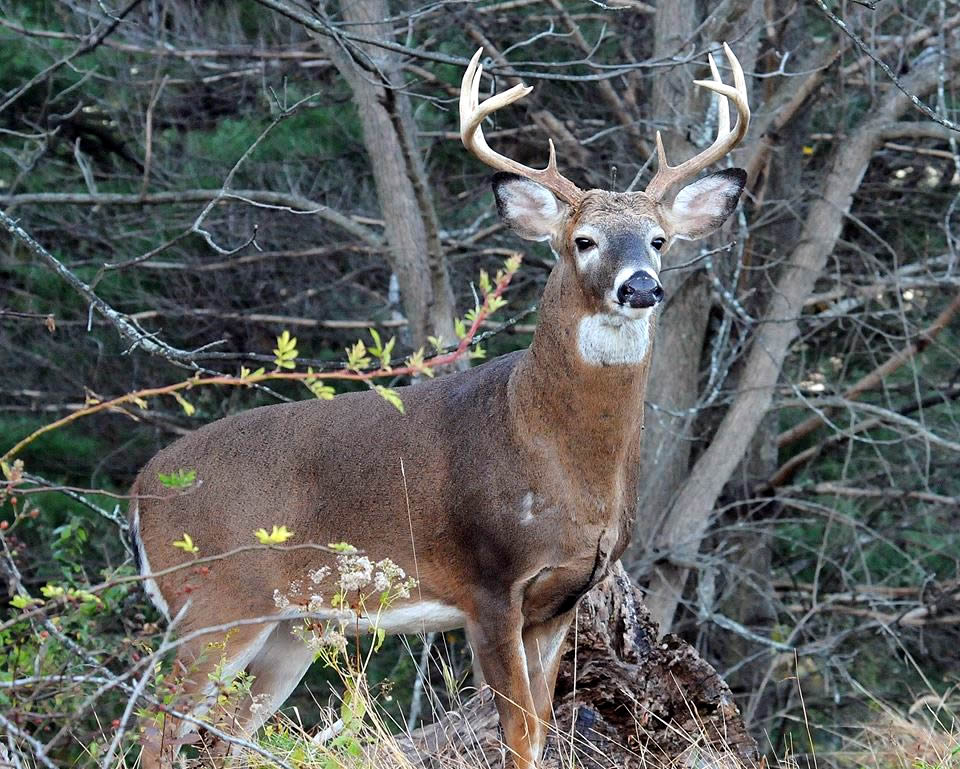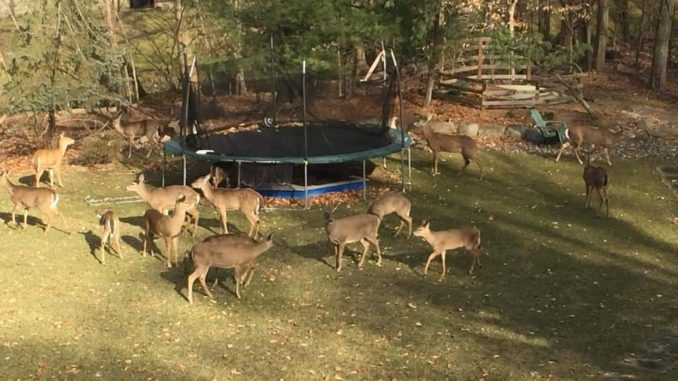
RIVER VALE, N.J.—Following nearly two dozen speakers May 13 voicing opposition to a proposed deer bow hunt later this year—plus many anti-hunt social media comments and a street protest by animal advocates—Mayor Glen Jasionowski said the council would “pause” its decision to hold a hunt and allow residents to express their opinions before ultimately deciding what to do.
A final decision whether to move ahead with a hunt, possibly put the question on November’s ballot, or do nothing will be made by the end of May, Jasionowski said following the meeting.
Approximately 60 residents and others filled Township Council chambers to express opposition to a future deer hunt, although one resident publicly supported the council-approved deer bow hunt.
Council members approved a deer bow hunt by consensus—no formal vote was taken April 8—and every member expressed agreement with the decision to move forward with a deer bow hunt.
The council must pass an ordinance or resolution before a hunt is approved.
Most residents opposed to the hunt said killing deer was inhumane—deer with arrows stuck in them might run for miles before dying—and urged more consideration of non-lethal options.
Others said a deer hunt used only violence to solve a problem, was sure to upset children, does not belong in River Vale, and might hurt property values.
Councilmembers listened to all the speakers—only one supported a hunt—and answered all questions while noting the level of discontent and passion among speakers.
Lethal, non-lethal options
Prior to approving a bow hunt, council members heard from advocates for lethal and non-lethal deer management, including state Fish and Wildlife biologists, and have been discussing the issue since the fall when Jasionowski said at a breakfast event that a local deer hunt was likely.
Following his October announcement, Jasionowski and council agreed to hear from advocates on both sides and have been inundated with messages pro and con via emails, social media, and at occasional council sessions.
Jasionowski previously said he has been personally attacked on social media for voicing support for a hunt, and said a postcard mailing recently sent to about 1,000 local residents—taken from a list of local pet owners—was not factual, incited panic among residents “and caused numerous people to start attacking me and threatening me, which I think was done for no other reason but to cause a riot in town.”
When Mark Nagelhout, an Animal Protection League of New Jersey member responsible for the postcard mailing, questioned the mayor about his statement, the mayor became incensed.
“There’s not another person in the world that’s educated that thinks that’s fact. The mailer you sent out…it’s to create panic, that’s what you did,” Jasionowski said.
Nagelhout had spoken at several other meetings, providing the council with information on non-lethal methods and urging member s to consider non-lethal deer control.
He said his mailing was to create awareness and not panic. He called for creation of a non-lethal regional wildlife management commission that comes up with regional solutions, and predicted the state wildlife agency will soon approve deer sterilization as a non-lethal option.
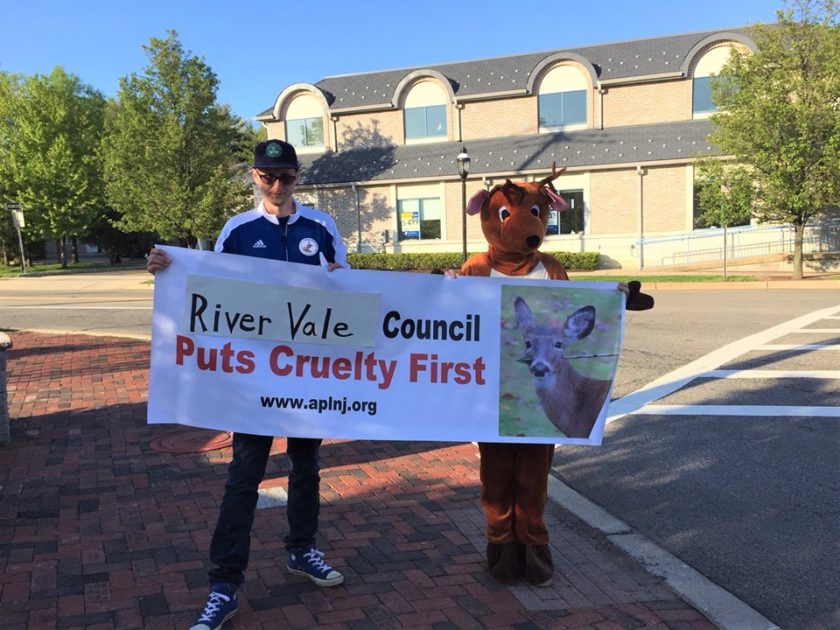
A non-lethal future?
“The minute the state approves a non-lethal option we’ll reconsider and look at it to see if that’s the right solution for River Vale,” Jasionowski said.
Nagelhout criticized the council for not moving ahead with non-lethal control strategies, including white cloth on posts on Rivervale Road and Westwood Avenue to reduce deer–vehicle accidents.
Nagelhout challenged Jasionowski’s deer–vehicle accident data saying 14 percent of all accidents were deer-related in 2015 versus 17 percent as deer-related in 2018. However, Jasionowski said the deer–vehicle accidents went from two deer–vehicle collisions in 2002 to over 50 incidents in 2018.
The postcard mailer disseminated by Animal Protection League of New Jersey lists bullet points opposing the hunt.
One side says: “You can stop the proposed deer hunt,” with a photo of a fawn. The reverse side shows a photo of a bow hunter about to launch an arrow, with five statements including homeowners “have no remedy if opposed to these deadly weapons” and “extreme cruelty to deer, ineffective and divides the community.”
“It’s a very tough hard decision,” said councilwoman Denise Sieg.
“What hurts me is I’m not an inhumane person and no one sitting up here is like that. Bottom line, there is a lot of misinformation,” she said.
She noted it wa “disturbing” that a rumor mill has taken over town on the issue.
“We want the best for this township. Nobody here wants to see an animal suffer,” she said, urging residents to write to area assembly representatives and the governor for more approved non-lethal deer reduction options.
“That could be maybe a solution that could help all of us. We’re not horrible people. Please understand that,” Sieg added, as audience members applauded.
The mayor said should a hunt move forward, a professional bow hunters’ group would be contracted with and hunting would only be allowed on local golf courses and other non-residential open spaces.
Bromberg noted bow hunters would be shooting downward at a deer during a regulated bow hunt.
‘Very proficient’ hunters
“They are very proficient and have a extremely high rate of success. They’re not looking to harm animals or drag this out, It’s usually a quick procedure,” said Bromberg, who noted council was likely donating deer meat to an area food bank if a hunt occurs.
During a break, council members noted only four animal advocates were protesting during an anti-deer hunt demonstration.and Council Vice President Paul Criscuolo noted his son texted him about the protest saying the protesters did not like him.
Jasionowski said he wants residents to reach out to him about the deer population issue and that he appreciates courteous public feedback.
At least six speakers urged the council to put the deer hunt issue on the November ballot so residents can say whether to move forward.
Earlier, Jasionowski told a resident that state Fish & Game Council will not approve a sterilization program and that the council was dealing with “the facts” as presented by experts on both sides and “making the best decision” for residents.
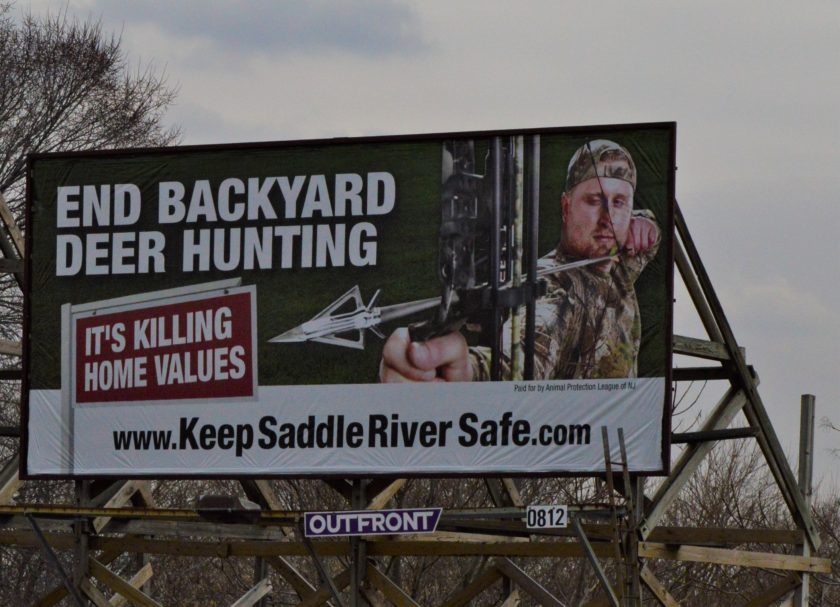
‘We can do nothing or take a lethal approach’
“The state will not approve a contraceptive program,” Jasionowski said, noting nearby Saddle River’s plan to sterilize deer was rejected by state wildlife officials last year.
“Either we can do nothing or take a lethal approach,” he told one resident.
Council President Paul Criscuolo pointed out that deer don’t travel well, say many experts.
“They don’t travel well…and don’t acclimate to their new area very well. It’s just as dangerous as killing them,” he said.
“It comes down to do we solve the issue or do we let the population double every nine months,” Criscuolo added.
State ‘drive(s) the plan’
“We don’t get to drive the plan. Any plan we decide on has to be approved by the state,” Jasionowski said, noting initially the council did not realize the state was generally opposed to most non-lethal options.
Bromberg said the council heard from experts for and against a deer hunt over the last six months.
“We considered all these possibilities…everybody came to these discussions with a completely open mind,” he said. Bromberg noted “there’s a lot of misinformation out there” but that after listening to experts, they decided to investigate a culling operation to reduce deer numbers in River Vale.
Most who spoke urged the council to reject a deer bow hunt, noting deer are not the only carrier of ticks that spread Lyme disease, and said they did not want a hunt. A few urged more regional action on deer management.
Sharon Jackson asked how long would it take the deer population to “self-correct” or reduce itself naturally.
Jasionowski said the deer census and consultation with state Fish and Wildlife officials would help them determine how many deer need to be culled to bring the population back into balance.
Jackson said she was also concerned about an increase in predators of deers—especially coyotes—and noted finding a deer carcass near her deck, only 10 feet from her young son playing on the deck.
“We do need to act…doing nothing is not really an option,” Bromberg said.
Council members approved a $3,367 drone deer census survey April 22 to determine local deer population and enable state experts to figure an appropriate kill estimate for a deer hunt.
Jasionowski said the census count was anticipated the third week of May. The survey was conducted by Biology Professor Jay Kelly, Raritan Valley Community College, Branchburg.

